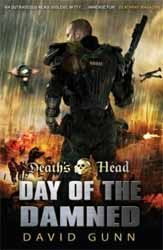|
Click here to return to the main site. Book Review
Lieutenant Sven Tveskoeg, soldier in the Death’s Head, has DNA which marks him out as something more or less than human. In an unforgiving universe Sven’s ability to heal has helped him ward off the worst that a brutal and unforgiving universe has thrown at him. But now his world is in turmoil, the undying emperor OctoV is missing, possibly dead, and plots are being put into place which will threaten the only people he cares about. With Anton and a newly recruited ally, Leona, Sven must fight his way to the capital to rescue Colonel Vijay, before General Luc has a chance to cut his heart out. But before he can fulfil his mission he will need to wade through danger, death and betrayal... Death’s Head: Day of the Damned is the third book in the Death’s Head trilogy by David Gunn. Not having read the preceding two volumes I am somewhat forced to view the book as a standalone work. There has been a long tradition of first person narrative, military science fiction. These include Robert Heinlein’s Starship Troopers (1959), Joe Haldeman's The Forever War (1974) and more recently David J. Williams’ Mirrored Heavens (2008), though where the preceding novels had a philosophical or political message Day of the Damned appears to have little in the way of subtext. The book is narrated from the perspective of Sven, giving us a limited view on both his world and the major players. He is a brutish man, who, shall we say, is not the deepest of thinkers. True it’s not the first science fiction novel to have a man with few redeeming qualities as its anti-hero - Gulliver Foyle in Alfred Bester’s The Stars My Destination (1956), could almost be Sven’s brother with his innate brutality and lack of morality, but where Bester took Foyle on a journey, where his character develops, Sven is pretty much the same person at the end of the novel. This criticism may be unfair, had I had the opportunity to read the whole trilogy, but such is the life of the reviewer that it is not unknown to get single books which forms part of a greater whole. At the start of the book our baby killing, cannibalistic Sven is holidaying on the Wildeside estate with Aptitude, Anton and Debro, who owe him a debt of honour as he had previously rescued them from a prison planet. Gunn provides enough background information to keep the plot racing along, but it generally lacks the necessary depth to get the reader interested in the bigger picture. We do discover that much of the human world struggles under the fascistic rule of OctoV, an immensely old half-child, half-machine. This is not the only empire and out amongst the stars is the Commonwealth of Free Peoples, the description of which owes more than a little debt to Ian Bank’s Culture novels. The story is fairly straightforward as Sven fights his way to the capital in an effort to save Aptitudes love, gets involved with the fall of OctoV, gets captured and gets away. As the book is written in the first person, everything we experience is experienced through the eyes of Sven. The writing is punchy and the chapters short enough to make the book ideal for reading on the train. In this case its lack of complexity is an added bonus. Some may weary of the endless passages of killing and carnage, for others this may be a perfect bonus. Although I felt generally negative towards the novel, I did like Sven’s caustically sardonic sidearm and would have preferred it if Gunn had spent more time in fleshing out both his characters and their environment. The book creates a nonstop roller coaster of libidinous violence which will appear to fans of Gunn’s work. Personally, I felt it lacked the depth which would have brought the book to a much better level. 5 Charles Packer Buy this item online |
|---|


